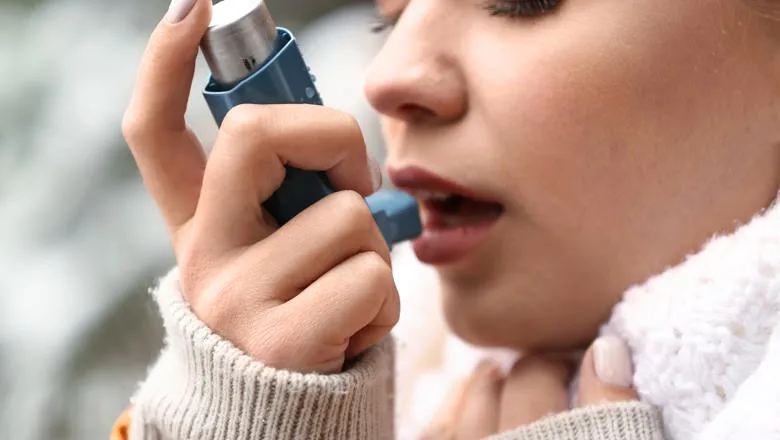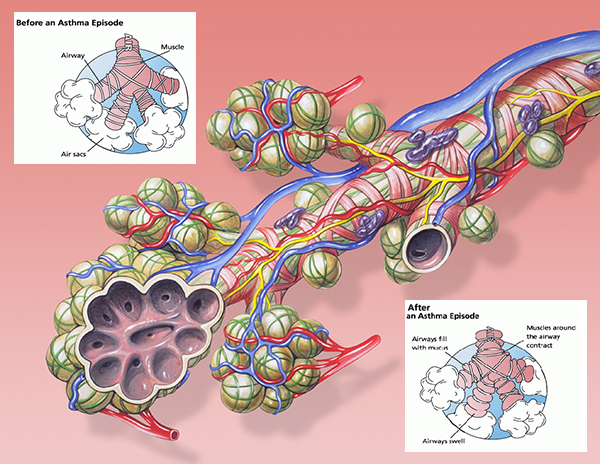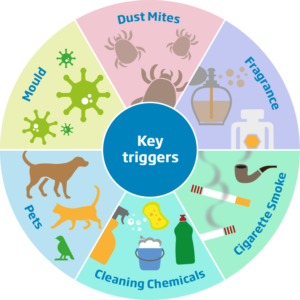Introduction

- Researchers say they have found the first new treatment for asthma attacks in 50 years.
- A landmark study led by a King’s academic has shown that severe asthma can be controlled using biologic therapies, without the addition of regular high-dose inhaled steroids which can have significant side effects.

- The findings from the multinational SHAMAL study, published in The Lancet, demonstrated that 92 per cent of patients using the biologic therapy Benralizumab could safely reduce inhaled steroid dose and more than 60 per cent could stop all use.
- The study’s results could be transformative for severe asthma patients by minimizing or eliminating the unpleasant, and often serious, side effects of inhaled steroids. These include osteoporosis which leads to increased risk of fractures, diabetes and cataracts.
- Asthma is one of the most common respiratory diseases worldwide – affecting almost 300 million people – and around 3 to 5 per cent of these have severe asthma. This leads to daily symptoms of breathlessness, chest tightness and cough, along with repeated asthma attacks which require frequent hospitalization.
- The SHAMAL study was led by Professor David Jackson, Professor of Respiratory Medicine at King’s and head of the Severe Asthma Centre at Guy’s & St Thomas’ NHS Trust.
Biological therapies such as Benralizumab have revolutionized severe asthma care in many ways, and the results of this study show for the first time that steroid related harm can be avoided for the majority of patients using this therapy.
Professor David Jackson, Professor of Respiratory Medicine
- Benralizumab is a biologic therapy that reduces the number of inflammatory cells called eosinophil. This is produced in abnormal numbers in the airway of patients with severe asthma and is critically involved in the development of asthma attacks.
- Benralizumab is injected every four to eight weeks and is available in specialist NHS asthma centers.
- The SHAMAL study took place across 22 sites in four countries – the UK, France, Italy and Germany.
- The 208 patients were randomly assigned to taper their high dose inhaled steroid by varying amounts over 32 weeks, followed by a 16 week maintenance period. Approximately 90 per cent of patients experienced no worsening of asthma symptoms and remained free of any exacerbations throughout the 48 week study.
- Similar studies to SHAMAL will be necessary before firm recommendations can be made regarding the safety and efficacy of reducing or eliminating high dose steroid use with other biologic therapies.
- The injection dampens part of the immune system that can go into overdrive in flare-ups of both asthma and a lung condition called chronic obstructive pulmonary disease (COPD).
- Benralizumab is already used in the most severe cases, but the latest research suggests it could be used routinely for around two million attacks in the UK each year.
- The research team at King’s College London said the drug was a “game-changer” that could “revolutionize” care.
- The findings stem from the realization that not all asthma or COPD attacks are the same. Instead, different parts of the immune system are over-reacting in different patients.
“Now we can see there are different patterns of inflammation, we can be smarter and get the right treatment, to the right patient, at the right time,” said Prof Mona Bafadhel, from King’s.
Benralizumab targets a type of white blood cell – called an eosinophil – that can cause inflammation and damage in the lungs.
Eosinophils are implicated in about half of asthma attacks and a third of COPD flare-ups.

- If such an attack – involving difficulty breathing, wheezing, coughing and chest tightness – cannot be controlled with regular inhalers then doctors currently prescribe a course of steroids.
- The study, on 158 people, monitored patients for three months after treatment for a flare-up.
The results in The Lancet Respiratory Medicine found a treatment failure rate of:
- 74% when taking steroids
- and 45% with the new therapy
- People treated with the new therapy were less likely to be admitted to hospital, need another round of treatment or die.
- Prof Bafadhel said this could benefit a huge number of people as two million attacks a year “is not a small number”.
- “This is a game-changer, we’ve not had a change in treatment for 50 years – it will revolutionise how we treat people when they’re really unwell,” Prof Bafadhel said.
- Volunteers also reported improved symptoms and a better quality of life on the new drug.

- Alison Spooner, who is 55 and from Oxfordshire, was one of those taking part in the trial. She has had asthma since childhood, but it became worse over the past five years and she’s had three major attacks.
- “They seemed to be getting worse, the severe lack of breath was quite frightening when you’re gasping and there’s nothing to gasp at,” she told me.
- Alison says she felt “drastically different” after having the injection and still uses her inhalers but “only because I’ve been told to”.
- “Unfortunately, no drug gets rid of asthma completely, but this is the nearest thing. It’s a bit of a miracle actually,” she adds.
‘Massive Promise’
Benralizumab is not ready for wide scale use.
- It will still take a larger trial, due to start in 2025 and which will last two years, to be certain of any benefit. Anybody who is already given these drugs should continue to follow their prescription.
- That study will also have to assess cost-effectiveness since monoclonal antibodies, like this therapy, are expensive drugs.
- But Dr Sanjay Ramakrishnan, from the University of Oxford, said the work so far “shows massive promise” and that treatment for COPD was “stuck in the 20th Century” despite being one of the leading causes of death worldwide.
- Long-term use of steroids is linked with side-effects including weight gain, muscular weakness, immunosuppression, diabetes and weak bones.
- Geoffrey Pointing, 77, from Oxfordshire, who also took part in the trial, said: “I didn’t get any side effects like I used to with the steroid tablets.
- “I used to never sleep well the first night of taking steroids, but the first day of the study, I could sleep that first night, and I was able to carry on with my life without problems.”
It is estimated that four people with asthma and 85 people with COPD die in the UK every day.
Dr Samantha Walker, from the charity Asthma + Lung UK, said the results were “great news”.
- “But it’s appalling that this is the first new treatment for those suffering from asthma and COPD attacks in 50 years,” she said.
References:
1.https://www.bbc.com/news/articles/cev93777g79o
2.https://www.thelancet.com/journals/lanres/article/PIIS2213-2600(24)00299-6/fulltext
3.https://www.sciencedirect.com/science/article/abs/pii/S0140673616313228


Great work ..!
Can you be more specific about the content of your article? After reading it, I still have some doubts. Hope you can help me.
Can you be more specific about the content of your article? After reading it, I still have some doubts. Hope you can help me.
Your article helped me a lot, is there any more related content? Thanks!
Your article helped me a lot, is there any more related content? Thanks!
Thank you for your sharing. I am worried that I lack creative ideas. It is your article that makes me full of hope. Thank you. But, I have a question, can you help me?